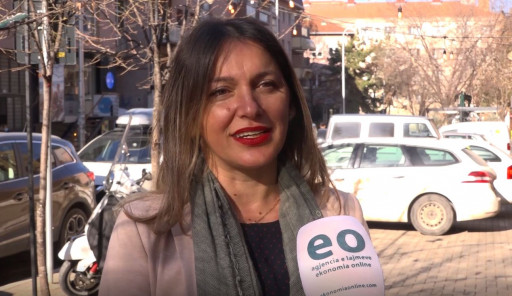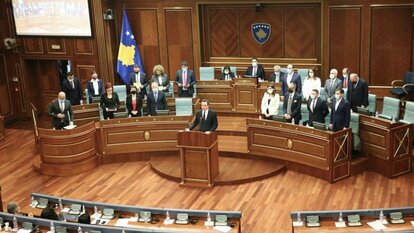KOSOVA/O
HAS SHOWN IMMPRESSIV PROGRESS WITH WOMAN IN POLITICS
The small and beautiful Kosovo, now is 14, and one-half year ago, February 14 parliamentary elections
marked an unprecedented tilt in the country’s internal balance of power. After years of dominance by
more established political parties, the up-and-coming Self-Determination Movement (LVV) is now
leading the country’s government with its winning reform agenda. LVV, with its successful anti-
corruption, justice and employment platform, reached new heights in last year elections. With more
than 50 percent of the vote, the party achieved a landslide victory and secured a record-high 58 seats in
Parliament.
Today, Kosovo is making important progress. More women are playing meaningful roles in public life-
-within political parties as candidates and leaders, through civil society organizations, and leading in
government. In last fall’s local elections, more women ran for office, more headed their party’s
candidate lists, and more were elected without the quota. At the national level, Kosovo has its second
woman president, and a record two women deputy prime ministers, one of whom also serves as one
of the five women ministers, eight chairs of the 14 committees, and a record 43 members of
parliament, 34 of whom were elected without the quota.
A significant step of this impressive progress is when women leaders won more seats in the
parliament, surpassing the gender quota of 30%. in recent years, the role of women in Kosovar
politics has become more visible and important, as demonstrated by the election of MS Vjosa
Osmani as president. MS Vjosa Osmani, was elected as the most voted politician in Kosovo's history
in February 14 elections 2021.
This significant change towards strengthens woman capacities, might have come from governance
program reform “ALTERNATIVA” offered from LVV with its orientation towards principles of
social democracy and progressivism. The social policies, addressing the needs of marginalized
categories; elderly, woman, children’s persons with disabilities are categories that are linked with
woman most concern categories. With regards to the elderly, LVV has made concert promise to
increase Basic Pensions. The specific reference that LVV made towards woman is pragmatic offer
includes establishment of social housing found where property would be given to woman applicants.
Further to that, LVV started that with objective of reducing the burden on woman and all workers
enforce five-day work a week for all non-managerial employers, and offering 160 new kindergartens
in cooperation with municipalities. Regarding the third category-that of children. LVV makes six
references to different groups of vulnerable children. LVV proposed policies towards alleviating the
position of more vulnerable children include child benefits of 10 EUR/month for all children under
the age fifteen. Another, measures, concerns food in schools, whereby free food is intended for all
pupils in the grades one to five, with intend of also expanding the food services to all pupils. By this
measure covered the category of persons included in the monitoring the poor as concrete measure
to alleviate the situation of low-income population.
Moreover, LVV aims for the greatest involvement of women in decision-making and politics.
Currently only every fourth member of the LVV is a woman. The chairman of LVV, Albin Kurti, in
a forum said that “The main focus of this party is the largest number of women in their base, since
according to him, women run the party and the state differently”. According to Kurti, “women are
staying away from politics as it is currently patriarchal politics. We must increase the participation of
women in politics. It is not a sufficient solution only to select a percentage up in the hierarchy, i.e. to
representative quotas, because we have often seen both in our country and in other countries that
when a woman has reached higher positions, the general situation for women does not has changed.
In my opinion we should work harder to increase the membership of women more. So our main
focus should be grassroots transformation.”
Despite the impressive progress, there is much work left to do. Women in government at the local
levels are marginalized, few have top leadership positions in main political parties, and most
companies are owned by men.
As an important part of this effort, men must also do more, and become champions for gender
equality. That means mentoring women, bringing them to the decision-making table, integrating
them into their networks, and providing them access to finances. Simply put, women’s equality will
not be achieved without a full partnership with men.
Even with this progress mention, however Kosovo faces many problems of economic, political and
educational natures. Kosovo needs a social and economic revolution, to change education and social
system and to promote economic, social rights, empowering girls, women on:
Increased access for women, in all their diversity, to decent work, including women’s transition to
the formal economy and coverage by non-discriminatory and inclusive social protection systems;
Improved policy, legal framework and access to care services enabling equal division of domestic
and care work between women and men;
Increased access for women in all their diversity to financial services and products, and productive
resources;
Women in all their diversity have improved access to entrepreneurship opportunities, including
social entrepreneurship, alternative livelihoods and strengthened participation in the green and
circular economy:
Improved access for women in all their diversity to managerial and leadership roles in social and
economic sectors and fora:
Reduction in gender disparities in enrolment, progression and retention at all levels of education and
lifelong learning for women, men, girls and boys:
Improved regulatory framework for ensuring equal access to universal and public quality preventive,
curative and rehabilitative physical and mental health care services for women, men, girls and boys,
in all their diversity, including in crisis situations.







